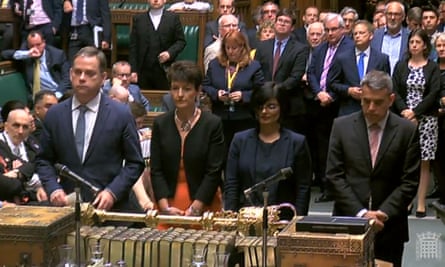Conservative MPs preparing to face down Theresa May next week are not rebels or traitors, but pragmatists who want to stop Britain going over a cliff edge, a leading member of the pro-Europe group has said.
Antoinette Sandbach told the Guardian the media toxicity surrounding even the most basic scrutiny of Brexit was transforming British society. “We are not rebels. We are pragmatic leavers. We don’t want to go off the edge of a cliff which would be a disaster for my constituents,” she said.
The MP for the largely rural Cheshire constituency of Eddisbury has voted against the government line just four out of 631 times since being elected in 2015, twice on a free vote about restoration plans for parliament, and another two on the ‘meaningful vote’ amendment.
“People put a label on you and call you a traitor and it’s ridiculous, it’s absolutely ridiculous,” Sandbach said. “This is the most complex thing that we have done for 40 years. There’s a level of debate and drilling down into the detail which has to be done. To try and do that, you’re accused of betraying the will of the people.
“Britain used to have a reputation for being polite and courteous; have we really turned into this shouty society that just screams at each other?”
MPs are preparing for yet another showdown in the Lords and the Commons next week after pro-European Conservative MPs who compromised with the prime minister to avert rebellion on Tuesday night subsequently rejected the government-drafted amendment to the EU withdrawal bill.
The former attorney general Dominic Grieve had held negotiations with the government over the precise wording of the amendment, aimed at enabling MPs to hold a vote in parliament if the government was on the brink of leaving the EU with no deal in place.

Grieve said the final version, tabled by the government on Thursday evening, had been changed at the last minute and was now unacceptable because the vote on offer would not give MPs the power to stop Britain going over a cliff edge.
Sandbach said it was “extraordinary” for the wording of the government amendment to be changed just before it was tabled. But she said she still trusted May and believed David Davis’s Department for Exiting the European Union (DExEU) was to blame.
“In the last hour before it was tabled, DExEU appeared to get involved and the process was hijacked and one was tabled that wasn’t agreed to,” she said. “I’d like to see grown-up government and it seems to me that DExEu is trying to reduce parliament to a school debating chamber.”
Peers, who will debate the legislation again on Monday, have tabled Grieve’s own wording in a separate amendment, which is likely to come back to the Commons. It remains to be seen if the pro-European MPs do have the numbers to finally defeat the government on the issue, and May may well have gambled that they do not.
Sandbach said she could not accept the government version, as it would place strict limits on the direction MPs could give in the event of a final Brexit deal being turned down by parliament.
She said: “It’s ridiculous that what we are being offered is an amendable motion in the event of a deal, but an unamendable one in the event of no deal that would cause a huge crisis in our country.”

Sandbach is a fixture in the so-called “naughty corner” of the green benches where Grieve, Bob Neill and Anna Soubry often sit with other Brexit-sceptic colleagues. Like those colleagues, Sandbach is a former barrister and she says it is the lack of attention to complex detail in the Brexit debate that most infuriates her.
“Many of my constituents will have got divorced. They will know how being together with somebody for a long time means that life is intertwined with them,” she said. “Divorce is messy and nasty and can get quite tricky. And this is a major divorce.”
Sandbach is reluctant to go into specifics of threats she has received for speaking out about Brexit, citing no desire to give any abuser “oxygen”. Last week, Sandbach was criticised for reporting a constituent to the police for accusing her of “treachery” and threatening her with deselection.
She will say, however, that it is not just Brexit that has made MPs feel increasingly nervous. The interview comes just after a far-right activist pleaded guilty to a plot to kill the Labour MP Rosie Cooper.
“Regardless of Brexit, we are targets,” she said. “That is wrong. And it is particularly targeted at women in parliament and it is cross-party, not just directed at remainers or Brexiters. So we must take a strong line. What is illegal face-to-face should be illegal online.”
Nor will she accept that she is doing her constituents any disservice by any threat to rebel against her party. “The vote in my constituency was very close and we need to find a Brexit that brings moderate leavers and moderate remainers together,” she said.
“I think the 48% feel nobody is standing up and speaking for them. It’s simply not as black and white as it is being painted in the media.”
Like many of her colleagues, Sandbach is concerned there is little time left for the difficult negotiations on future trade, which are yet to fully begin. The last 18 months have been “evidence building”, she says – a process that could have been done before triggering article 50.
However, Sandbach is more careful than some of her colleagues not to directly criticise the prime minister’s approach. On Thursday night as the compromise agreement crumbled, Soubry called the actions of the government “unforgivable” and said MPs who had trusted the prime minister had been “very badly let down”.
Sandbach firmly believes that the vast majority of Conservative MPs are not purists, but would back a compromise if May could deliver one. May has said her red lines in the negotiations are ending the jurisdiction of the European court of justice, ending free movement, and leaving the single market and customs union.
“There are going to have to be compromises and some blurring of lines,” Sandbach said. “Of course the majority would back a compromise. We’ve backed it already. We backed the [December transition deal] joint report, it was cheered as a great success.”
Looming next in the Commons once the meaningful vote amendment is resolved are battles over both the trade and customs bills, set to be debated by mid-July. MPs have already put down amendments seeking to keep the UK in a new customs union with the EU.
Other likely amendments include mandating the government to seek an EEA-style arrangement, similar to Norway’s deal with the EU.
Sandbach has not ruled out backing either and said she sees some attraction in using the EEA as a framework for Britain’s future relationship. There will be disagreement ahead, she admits, but says it is not “some big crisis” that MPs should seek to amend and improve bills.
“The numbers in parliament make it difficult for the prime minister, there’s no doubt, but that is parliamentary sovereignty,” she said. “That is the will of the people. They elected a parliament with these numbers – and maybe that is no bad thing. It means there has to be a great degree of consensus.”
